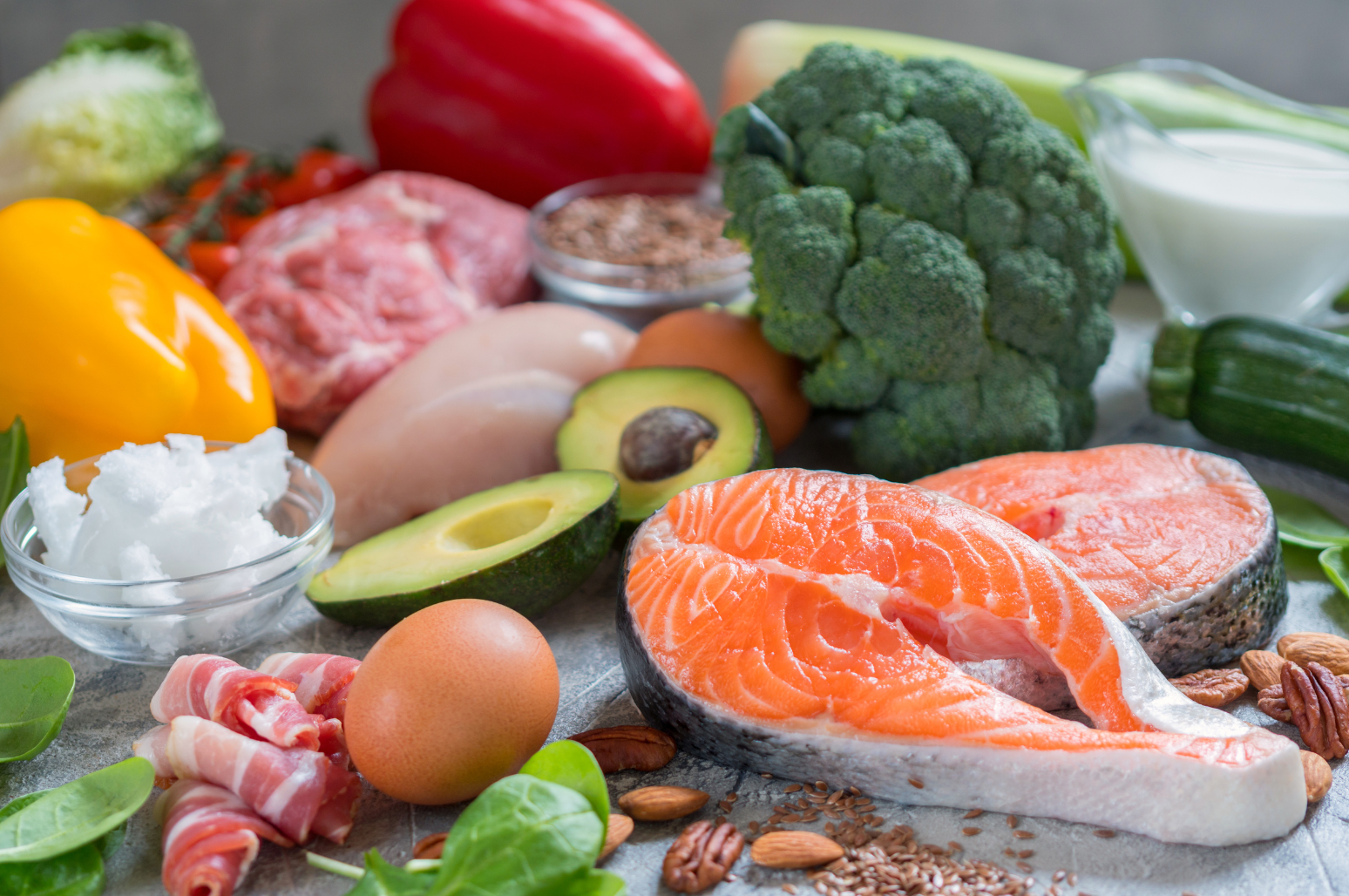
While both hypoglycemia and the keto flu have something to do with the glucose in your body, they are completely different things, and it’s helpful to know the difference. The keto flu sometimes occurs when the body is adjusting to a ketogenic diet, while hypoglycemia is a medical condition related to low blood sugar. Let’s delve deeper into the details and differences.
What Is the Keto Flu?
Keto flu refers to a cluster of symptoms some people feel when transitioning to a ketogenic diet. This ‘icky’ flu-like feeling is often called a carb withdrawal, and it happens when the body switches from primarily burning sugar (glucose) for fuel to burning fat instead by breaking it down into ketones. The body needs time to adjust to this new fuel source, and if you aren’t metabolically adapted and you typically eat a carbohydrate-heavy diet, you might be more likely to experience symptoms [1].
The symptoms of keto flu can be mild or severe, and they can last for a few days to a week or longer. For most people, these symptoms are gone in less than a week. Read our article for more info on why carbs can make you tired.
What Are the Symptoms of Keto Flu?
Symptoms of keto flu include:
- Fatigue
- Constipation
- Brain fog
- Trouble sleeping
- Keto rash
- Minor cold
- Dry mouth
- Nausea
- Headache
- Muscle weakness and soreness
Fortunately, there are ways you can prevent and diminish keto flu, so you can get back to feeling like yourself again.
Whenever you make dietary changes, your body needs time to adjust. It isn’t exactly clear what causes keto flu, but the ability of carbohydrates to activate reward centers in the brain makes sugar addictive, which could be why some people experience what feels like a drug or caffeine withdrawal.
What Causes Keto Flu?
Most experts believe the most common cause of keto flu is a lack of electrolytes that occurs as the body transitions into ketosis. This drop in electrolytes takes place for a few reasons; for example, lower insulin levels on keto cause the kidneys to increase the excretion of electrolytes. It’s important you avoid overexercising, stay hydrated, and follow a well-formulated, nutritious ketogenic diet that includes plenty of healthy, mineral-rich, natural foods. You might decide to supplement electrolytes to help you feel better [2].

Read our article for more detailed information on the possible causes of keto flu and what you can do to prevent or diminish it.
What Is Hypoglycemia?
Hypoglycemia is a medical condition in which the body’s blood sugar (glucose) level is significantly lower than normal. Hypoglycemia warrants immediate medical attention.
This condition can be caused by or associated with certain drugs and conditions, including diabetes treatment. People with and without diabetes can experience hypoglycemia [3].
What Are the Symptoms of Hypoglycemia?
When blood sugar levels dip too low, symptoms include:
- Shakiness
- Sweating
- Fatigue
- Anxiety
- Irritability
- Trouble concentrating
- Numbness or tingling of cheeks or lips
- Dizziness or lightheadedness
- Pale skin
- Nausea and hunger
- Headache
- Fast or irregular heartbeat
Some of the more severe symptoms are:
- Slurred speech
- Loss of coordination
- Confusion and unusual behavior
- Nightmares
- Blurred or tunnel vision
Someone with severe hypoglycemia could become unresponsive and lose consciousness or have seizures.
Get medical attention as soon as you can if:
- You have symptoms of hypoglycemia, but you don’t have diabetes
- You have diabetes, but your condition isn’t responding to treatment like taking glucose tablets
A fasting blood sugar of 70 milligrams per deciliter (mg/dL) or 3.9 millimoles per liter (mmol/L) typically indicates hypoglycemia, but numbers vary depending on the individual. Keeping on top of your blood sugar levels through testing can help you determine where your normal range is and when you might be dipping low.
If you’re ever unsure about your blood sugar levels or diet, or if you have any questions, always visit your healthcare provider.
What Causes Hypoglycemia?
When blood sugar levels spike too high, someone with diabetes might take too much insulin or a diabetes medication that causes blood sugar levels to drop too low. Hypoglycemia can also occur if you have diabetes and you exercise a lot more than normal or if you eat less than you normally do after taking your usual dose of diabetes medication. Other causes of hypoglycemia in people who don’t have diabetes include:
- Severe liver illness
- Long-term starvation
- Tumor in the pancreas
- Hormone deficiencies
- Excessive alcohol drinking
Hypoglycemia can increase your risk of Alzheimer’s disease, and, in some cases, it can be fatal.
When hypoglycemia happens, immediate treatment usually involves getting your blood sugar levels back to normal with a medication or food or drink. Long-term treatment involves determining the cause of hypoglycemia and improving blood sugar regulation through different methods, such as lifestyle.
What’s the Difference Between Keto Flu and Hypoglycemia?

While keto flu is just a passing cluster of symptoms that usually goes away within a week, hypoglycemia is a medical condition that should be taken seriously, particularly if you have diabetes or blood sugar issues.
Some people going keto might experience some degree of a reduction in blood sugar levels and electrolytes, which could make you feel like you have the flu, but it isn’t usually a cause for concern. As you replenish electrolytes and as your body becomes more metabolically adapted, symptoms of keto flu should resolve. On the other hand, hypoglycemia requires more careful monitoring and management.
Can Going Keto Help Manage Hypoglycemia?
While it’s best to consult your doctor before going keto if you struggle with hypoglycemia, many who deal with hypoglycemia successfully live a keto lifestyle and report that keto normalized their blood sugar, helping them leave hypoglycemia in the past. Research shows a ketogenic diet and ketones can improve hypoglycemia and reduce symptoms, though more studies are needed [4] [5].
The internet is full of anecdotal success stories from people sharing how the keto diet helped their body and metabolism to function properly again, so they no longer had to obsessively meal plan or stress and worry about food and blood sugar. For example, instead of eating seven small meals a day to manage hypoglycemia, a keto dieter might now eat three sizeable meals daily and snack when needed, making sure to include fat with meals. Many eat starchier carbohydrates like plantains and sweet potatoes here and there when they want to. It all depends on your health and individual metabolism.
Following a balanced ketogenic diet has been shown to improve blood sugar regulation and insulin resistance. If blood sugar spikes too high due to excess carbohydrate and sugar consumption, going keto and stepping off the blood sugar rollercoaster can prevent these high blood sugar spikes and normalize levels over time. When meals are carb-heavy and lack fat, blood sugar increases quickly and becomes more unstable. Even so, especially if you have a medical condition like diabetes, it’s best to work with your healthcare professional when switching to a new diet.
Have you experienced the keto flu? Have you experienced hypoglycemia? Do you follow a ketogenic diet? Share your thoughts and experiences with the community here at Ketogenic.com.
References
Sajadi-Ernazarova, K. R., Anderson, J., Dhakal, A., & Hamilton, R. J. (2022). Caffeine Withdrawal. Treasure Island Publishing. Caffeine Withdrawal - StatPearls - NCBI Bookshelf (nih.gov)
Popkin, B. M., D’Anci, K. E., & Rosenberg, I. H. (2010). Water, hydration, and health. Nutr Rev, DOI: 10.1111/j.1753-4887.2010.00304.x
Mayo Clinic. Hypoglycemia. Symptoms, Causes, Diagnosis, Treatment. Hypoglycemia - Symptoms and causes - Mayo Clinic
Johnson, W. A., & Weiner, M. W. (1978). Protective effects of ketogenic diets on signs of hypoglycemia. Diabetes, 27(11), 1087-1091. https://doi.org/10.2337/diab.27.11.1087
Yamada, K. A., Rensing, N., & Thio, L. L. (2005). Ketogenic diet reduces hypoglycemia-induced neuronal death in young rats. Neuroscience Letters, 385(3), 210-214. https://doi.org/10.1016/j.neulet.2005.05.038










